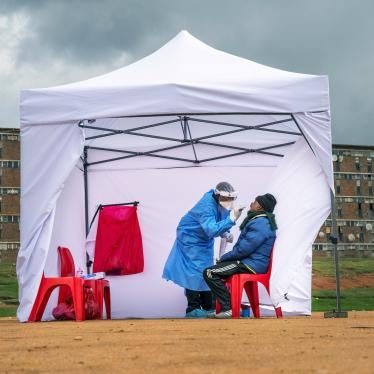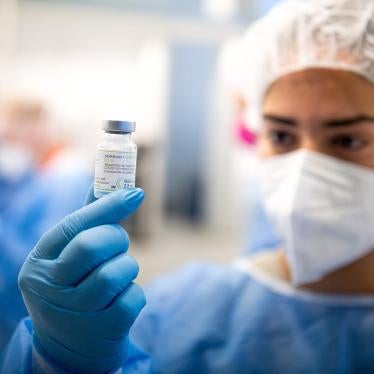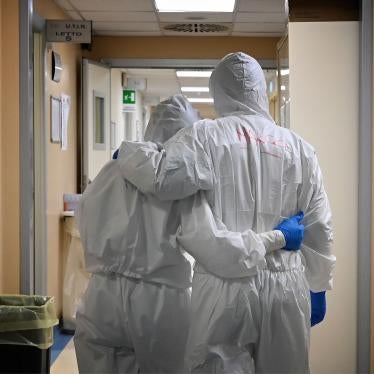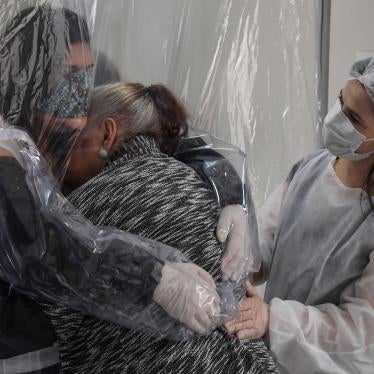Responses to the letter can be found here and here:
To:
Dr. Richard Hatchett, Coalition for Epidemic Preparedness Innovations (CEPI)
Dr. Seth Berkley, CEO, Gavi, The Vaccine Alliance (Gavi)
Ms. Jane Halton, Chair, Board, CEPI
Dr. Ngozi Okonjo-Iweala, Chair, Board, Gavi
Dr. José Manuel Barroso, Incoming Board Chair, Gavi
Ms. Sarah Goulding, Vice Chair, Board, Gavi
Dr. Soumya Swaminathan, Chief Scientist, World Health Organization
via email
Dear Dr. Hatchett, Dr. Berkley, Ms. Halton, Dr. Okonjo-Iweala, Dr. Barroso, Ms. Goulding, and Dr. Swaminathan:
Greetings from the undersigned public health and human rights organizations. We welcome the important steps that the Coalition for Epidemic Preparedness Innovations (CEPI) and Gavi, the Vaccine Alliance, together with the World Health Organization (WHO), have taken towards making vaccines accessible to low- and middle-income countries. We are writing to provide concrete recommendations based on human rights standards and principles and hope these are of value to your important efforts, and to seek additional information.
We share your belief that the pandemic demands extraordinary global cooperation and that the COVAX Pillar of the Access to COVID-19 Tools Accelerator and the COVAX Facility (jointly “COVAX”) have an important role to play in ensuring that vaccines are available and affordable for all, especially those in low- and middle-income countries.
As powerful public-private partnerships discharging global public health roles, CEPI and Gavi have a responsibility to uphold human rights standards and principles, including those outlined in the October 2020 Human Rights Watch report, “Whoever Finds a Vaccine Must Share It,” and those affirmed in recent statements by the Office of the High Commissioner for Human Rights as well as the UN Special Procedures.[1]
A rights-respecting approach to vaccine development and distribution means that private entities should “(a) avoid causing or contributing to adverse human rights impacts through their own activities, and address such impacts when they occur; (b) seek to prevent or mitigate adverse human rights impacts that are directly linked to their operations, products or services by their business relationships, even if they have not contributed to those impacts” as outlined in the United Nations Guiding Principles on Business and Human Rights.[2] Public-private partnerships, which receive government funds and act in lieu of government and intergovernmental agencies, have even greater obligations.
We welcome COVAX’s aim to be “a global solution for equitable access.”[3] Yet many low- and middle-income countries’ representatives worry that they will experience significant delays in accessing safe and effective Covid-19 vaccines, especially since high-income governments have already prebooked hundreds of millions of vaccine doses in an environment where initial vaccine supply will be scarce and the logistics of transportation challenging.[4] This and other barriers related to transparency, supply, and pricing undermine global efforts to make vaccines available and affordable to all. The Human Rights Watch report, “Whoever Finds the Vaccine Must Share It,” details some of these issues.[5]
Recent legal disputes over intellectual property surrounding the development of Covid-19 vaccines show that intellectual property claims could impede universal and equitable access to Covid-19 vaccines.[6] The patent landscapes surrounding vaccines are complex.[7] Already, forty-one countries, mostly lower middle-income, have joined the WHO and called on all governments and others to create a common shared pool of Covid-19-related technology, know-how, and data (the Covid-19 Technology Access Pool, or C-TAP).[8] The African Union ministers of health and heads of delegation issued a communique highlighting the challenges for vaccine access in Africa, calling on all governments “to ensure that all relevant technologies, intellectual property, data and know how are openly and immediately made available and rapidly scaled-up.”[9] India and South Africa, joined by other co-sponsors, have proposed a waiver of some key intellectual property rules under the Agreement on Trade-Related Aspects of Intellectual Property Rights raising concerns around intellectual property and related legal barriers. [10]
To bolster confidence and credibility in COVAX’s commitment to equitable access, CEPI and Gavi, and COVAX should undertake robust human rights due diligence, assessing specifically for risks related to supply, manufacturing capacity, the intellectual property landscape, and pricing. Disclosing that due diligence would help build public confidence in your efforts to combat the pandemic by showing how those risks are mitigated to deliver on your promise of equitable vaccine distribution.
We recognize that you are already addressing some of these issues and welcome the recognition given to transparency and managing institutional and individual conflicts of interest in the November 2020 publication providing additional details surrounding the COVAX Pillar’s Structure and Principles.[11] We also welcome the publication of terms and conditions, and agreements governing the participation of self-financing countries.[12]
In Annex I to this letter we have included detailed recommendations around four topics (a) deepening transparency; (b) maximizing vaccine availability and affordability; (c)strengthening governance; and (d) providing vaccine injury compensation. In Annex II to this letter, we have included a list of questions on (a) contracts with developers and manufacturers; (b) human rights due diligence; (c) global cooperation; and (d) self-financing and advance market commitment (AMC) countries. We are eager to learn more about the policies, procedures, and other design-related elements of COVAX that are already in place or underway. We would welcome a written response to the questions by January 15, 2021. All written responses will be reflected in our publications.
As a public-private mechanism dedicated to providing a global solution for equitable vaccine access, COVAX should look beyond the immediate Covid-19 crisis and build the groundwork for longer-term impact. We urge that COVAX adopts an approach that develops the vaccine manufacturing capacity of low- and middle-income countries, especially those that are significantly or wholly dependent on imports. This would help ensure that countries’ access to lifesaving vaccines is not thwarted by supply chain disruptions during future pandemics or epidemics.
As part of this effort, we urge that the work of COVAX be aligned with Sustainable Development Goals (SDGs). SDGs 3 and 9 are particularly relevant to COVAX. SDG 9 on industry, innovation, and infrastructure urges governments to “[b]uild resilient infrastructure, promote inclusive and sustainable industrialization and foster innovation,”[13] including for target 9.5.[14]
We thank you for your consideration and welcome opportunities to discuss this further. Please do not hesitate to contact us for any clarifications on these proposals, to provide the information requested in Annex II by January 15, 2021, or to coordinate a conference call with us.
Best regards,
Arvind Ganesan
Director, Business and Human Rights
Human Rights Watch
Peter Maybarduk
Access to Medicines Director
Public Citizen
Sidney Wong
Interim Co-Director
MSF Access Campaign
Stephen Cockburn
Head of Economic and Social Justice
Amnesty International
CC:
Gavi Board of Directors
CEPI Board of Directors
COVAX Coordination Meeting
via email
Annex I: Detailed Recommendations
A. Transparency
- Publish all agreements, advance market commitments, and statements of intent surrounding vaccine research and development, and procurement. This includes a) all underlying agreements CEPI has signed surrounding the nine vaccine candidates that are part of the COVAX Facility; b) vaccine procurement agreements signed with AstraZeneca, Serum Institute, and Novavax; as well as the Sanofi and GSK Statement of Intent.[15]
- Publish in full all industry responses to the UNICEF Supply Division and Pan-American Health Organization Request for Proposal published on November 11, 2020.[16]
- Publish an index that specifies which option (Committed Purchase Arrangement or Optional Purchase Arrangement), what percentage (10-50 percent) of their population, and the total number of doses that each of the Self-Financing Participants have elected to receive through the facility. Additionally, publish the overall volume of doses that the COVAX Facility (for both Self-Financing Participants and AMC countries) is trying to secure for all participants.
- Publish an index of each Self-Financing Participant’s required down payment and the status of its receipt.
- Publish an index of each AMC country’s co-financing/cost-sharing commitment and status of its receipt.
- Publish and periodically update information about each vaccine candidate in the COVAX Facility’s portfolio. This should, at a minimum, include information about:
a) How each candidate compared on a set of common criteria used to assess them (for example, cold-chain, previous use of technology; efficacy);
b) Due diligence and related results regarding the patent landscape for the vaccine candidate;
c) Due diligence and related results around legal disputes surrounding the vaccine candidate;
d) Price estimates;
e) Due diligence and related results to assess manufacturing capacity for the underlying vaccine platform technology, identifying what manufacturing capacity is booked up, what is available, and what can be repurposed or scaled up.
- Publish and periodically update information about each vaccine candidate in the COVAX Facility’s portfolio. This should, at a minimum, include information about:
- Collate and publish vaccine candidate’s clinical trial results in a time-bound manner on an open access basis (free and unrestricted access) in line with the 2015 WHO Statement on Public Disclosure of Clinical Trial Results.[17]
- Publish, on a timely basis, meeting minutes from each of the COVAX Pillar’s working group
B. Maximize Availability and Affordability
- Develop and publish—in consultation with civil society—a human rights and equitable access policy that guides the design and work of the COVAX Facility.
- Endorse the Covid-19 Technology Access Pool (C-TAP) and align the COVAX Facility’s design to operationalize and implement C-TAP.
- Ensure that contracts with companies developing and manufacturing vaccines:
a) require open and non-exclusive licensing, and wherever needed, technology transfers to share all relevant intellectual property to scale-up manufacturing;
b) price vaccines in a way that maximizes affordability, minimizes debt for low- and middle-income countries, and prioritizes public benefit over private profit;
c) require transparent pricing verifiable by third-party audits that are published; and - At a minimum, ensure corporate compliance with CEPI equitable access policy, and exercise public health licenses and other safeguards contained in CEPI contracts to scale-up affordable supply.[18]
C. Strengthen Governance
- Integrate low- and middle-income governments and civil society representatives, including those with varied expertise on access to medicines, IP barriers, and human rights, into the various bodies that are part of the COVAX Pillar structure, including in decision-making processes concerning the facility’s contract negotiations with companies and vaccine allocation decisions. [19]
- Expand on the principles governing conflicts of interests articulated in the COVAX Pillar Structure and Principles, and develop and publish—in consultation with rights groups and experts on access to medicines—a Conflicts of Interest Policy that applies to the senior leadership of CEPI, Gavi, their boards, and the COVAX Pillar structure.[20] The policy should, among other things:
a) Outline procedures for publicly disclosing conflicts of interest;
b) Create an independent high-level committee, including civil society representatives, to assess conflicts of interests and oversee the implementation of the conflicts of interest policy; and
c) Periodically publish reports about how the policy was implemented. - Develop and publish—in consultation with rights groups and access-to-medicine experts—a whistleblower policy and constitute a high-level committee comprised of independent experts. Among other things, the external committee should be empowered to receive and investigate complaints about the COVAX Facility’s work and provide reports to the boards of CEPI, Gavi, and those part of the COVAX Coordination Meeting.
D. Vaccine Injury Compensation Program
- Develop and publish—in consultation with low-and-middle income governments, civil society, patient rights advocates, and those participating in clinical trials—a vaccine injury compensation policy, program, and related procedures to evaluate claims and compensate individuals meeting defined criteria of injury related to the receipt of a vaccine.
Annex II: Request for Additional Information
We request you to kindly provide us with information to the following questions:
A. Contracts with developers and manufacturers
- How do contracts procuring vaccine for the COVAX Facility align with CEPI’s 2019 Equitable Access Policy?[21]
- Please provide copies of all underlying contracts signed by CEPI in relation to vaccine candidates that are part of the COVAX Facility.
- Please provide copies of all contracts procuring vaccine doses for the COVAX Facility. This includes agreements with AstraZeneca, Serum Institute of India, and Novavax; as well as the Sanofi and GSK Statement of Intent.
B. Human Rights Due Diligence
- Please outline the processes CEPI, Gavi, and COVAX are using to conduct effective human rights due diligence to evaluate the risks that exacerbate vaccine scarcity, including limited vaccine manufacturing capacity by technology, and underlying intellectual property rights.
- Please outline the steps CEPI or Gavi have taken to consult diverse intellectual property rights experts to evaluate intellectual property risks and their actual and potential impacts on Covid-19 vaccine supply and pricing, and develop prevention and mitigation measures. Please provide reports of these consultations.
- Have any studies been commissioned modelling vaccine access, controlling for intellectual property rights (for example, if COVAX Facility were designed in a way that was aligned with C-TAP vs. not aligned with C-TAP)? If yes, please provide copies of these studies.
- Have any studies been commissioned modelling vaccine access, controlling for tiered and flat pricing, to demonstrate how many people can get free vaccines under different pricing strategies, or how the debt-burden on low-and-middle income countries are impacted by these pricing strategies? If yes, please provide copies of these studies.
C. Global Cooperation
- What steps are CEPI and Gavi taking to align COVAX Facility’s design and work with the WHO’s Covid-19 Technology Access Pool?
D. Information about Self-Financing and AMC Countries and Economies
- Please provide a full list of participating self-financing governments/economies, providing the following details for each of them: whether they have opted for Committed or Optional Purchase Arrangement; what percentage (10-50 percent) of their population they are seeking to have vaccinated; the total number of vaccine doses the participant has elected to receive.
- For the 92 AMC-eligible countries and economies, please provide information about each AMC country’s co-financing/cost-sharing commitment and status of its receipt.
[1] Human Rights Watch, Whoever Finds a Vaccine Must Share It: Strengthening Human Rights and Transparency Around Covid-19 Vaccines (New York: Human Rights Watch, 2020), https://www.hrw.org/report/2020/10/29/whoever-finds-vaccine-must-share-it/strengthening-human-rights-and-transparency#9410; Office of the High Commissioner for Human Rights, “Statement by Michelle Bachelet, UN High Commissioner for Human Rights: A Joint Appeal for Open Science by CERN, OHCHR, UNESCO, and WHO,” October 27, 2020, https://www.ohchr.org/EN/NewsEvents/Pages/DisplayNews.aspx?NewsID=26433&LangID=E (accessed December 3, 2020); Office of the High Commissioner for Human Rights, “Statement by UN Human Rights Experts Universal access to vaccines is essential for prevention and containment of COVID-19 around the world,” November 9, 2020, https://www.ohchr.org/EN/NewsEvents/Pages/DisplayNews.aspx?NewsID=26484&LangID=E (accessed December 3, 2020).
[2] Office of the High Commissioner for Human Rights, Guiding Principles on Business and Human Rights: Implementing the United Nations “Protect, Respect and Remedy” Framework (New York and Geneva: United Nations, 2011), https://www.ohchr.org/documents/publications/GuidingprinciplesBusinesshr_eN.pdf (accessed December 3, 2020), Principle 13.
[3] COVAX Facility, “COVAX: The Vaccines Pillar of The Access to COVID-19 Tools (ACT) Accelerator Structure and Principles,” November 9, 2020, https://www.gavi.org/sites/default/files/covid/covax/COVAX_the-Vaccines-Pillar-of-the-Access-to-COVID-19-Tools-ACT-Accelerator.pdf (accessed on November 12, 2020), p.5.
[4] “Small Group of Rich Nations Have Bought Up More Than Half the Future Supply of Leading COVID-19 Vaccine Contenders,” Oxfam news release, September 17, 2020, https://www.oxfam.org/en/press-releases/small-group-rich-nations-have-bought-more-half-future-supply-leading-covid-19 (accessed November 9, 2020).
[5] Human Rights Watch, Whoever Finds a Vaccine Must Share It, 2020.
[6] Human Rights Watch, Whoever Finds a Vaccine Must Share It, pp. 53-54; Rebecca Tapscott, “Regeneron, Pfizer and BioNTech Accused of Infringing Allele Patent in Connection with COVID-19 Technologies,” IP Watchdog, October 7, 2020, https://www.ipwatchdog.com/2020/10/07/regeneron-pfizer-biontech-accused-infringing-allele-patent-connection-covid-19-technologies/id=126017/ (accessed November 30, 2020); Edward Hammond, “Patent Dispute Looms as a Major Complication for Moderna’s COVID-19 Vaccine,” Third World Network Info Service on Health Issues, August 3, 2020, https://twn.my/title2/health.info/2020/hi200801.htm (accessed November 30, 2020).
[7] Public Citizen, “mRNA-1273 Vaccine Patent Landscape (For NIH-Moderna Vaccine),” November 16, 2020, https://www.citizen.org/article/modernas-mrna-1273-vaccine-patent-landscape/ (accessed November 18, 2020); Public Citizen, “BioNTech and Pfizer’s BNT162 Vaccine Patent Landscape,” November 16, 2020, https://www.citizen.org/article/biontech-and-pfizers-bnt162-vaccine-patent-landscape/ (accessed November 18, 2020).
[8] World Health Organization, “Covid-19 Technology Access Pool: Endorsements of the Solidarity Call to Action,” https://www.who.int/emergencies/diseases/novel-coronavirus-2019/global-research-on-novel-coronavirus-2019-ncov/covid-19-technology-access-pool/endorsements-of-the-solidarity-call-to-action (accessed October 19, 2020).
[9] African Union and Africa Centers for Disease Control and Prevention (CDC), “Communique from Africa’s Leadership in Covid-19 Vaccine Development and Access Virtual Conference,” June 24-25, 2020, https://africacdc.org/news-item/covid-19-vaccine-development-and-access-virtual-conference/ (accessed October 19, 2020).
[10] World Trade Organization, Council for Trade-Related Aspects of Intellectual Property Rights, “Communication from India and South Africa: Waiver from Certain Provisions of the TRIPS Agreement for the Prevention, Containment, and Treatment of Covid-19,” October 2, 2020, IP/C/W/669, https://docs.wto.org/dol2fe/Pages/SS/directdoc.aspx?filename=q:/IP/C/W669.pdf&Open=True (accessed October 19, 2020).
[11] “COVAX: The Vaccines Pillar of the Access to COVID-19 Tools (ACT) Accelerator Structure and Principles,” November 2, 2020, https://www.gavi.org/sites/default/files/covid/covax/COVAX_the-Vaccines-Pillar-of-the-Access-to-COVID-19-Tools-ACT-Accelerator.pdf (accessed November 18, 2020) (COVAX: Structure and Principles).
[12] Gavi, “Explanatory Note: Legal Agreements with COVAX Facility Self-Financing Participants,” undated, https://www.gavi.org/news/document-library/covax-self-financing-participants-legal-agreements-and-explanatory-note (accessed December 8, 2020).
[13] United Nations Development Programme, “Goal 9: Industry, Innovation and Infrastructure,” Sustainable Development Goals, https://www.undp.org/content/undp/en/home/sustainable-development-goals/goal-9-industry-innovation-and-infrastructure.html (accessed November 2, 2020).
[14] UNDP, “Goal 9: Industry, Innovation and Infrastructure.” Target 9.5 says: “[E]nhance scientific research, upgrade the technological capabilities of industrial sectors in all countries, in particular developing countries, including, by 2030, encouraging innovation and substantially increasing the number of research and development workers per 1 million people and public and private research and development spending.”
[15] See for example, the agreement published by the (FIOCRUZ) (Oswaldo Cruz Foundation), a government research agency and AstraZeneca, https://agencia.fiocruz.br/sites/agencia.fiocruz.br/files/u34/contrato_etec.pdf (accessed November 5, 2020).
[16] UNICEF, “Covid-19 Vaccine: Request for Proposal,” November 11, 2020, https://www.ungm.org/public/Notice/117711; “UNICEF and PAHO Launch Joint COVID-19 Vaccine Tender on Behalf of COVAX Facility,” UNICEF news release, November 11, 2020, https://www.unicef.org/press-releases/unicef-and-paho-launch-joint-covid-19-vaccine-tender-behalf-covax-facility (accessed November 11, 2020).
[17] World Health Organization, “WHO Statement on Public Disclosure of Clinical Trial Results,” undated, https://www.who.int/ictrp/results/WHO_Statement_results_reporting_clinical_trials.pdf?ua=1 (accessed December 8, 2020).
[18] For a discussion of the content of CEPI’s contracts, see Public Citizen, “COVAX’s Choices,” November 16, 2020, https://www.citizen.org/article/covaxs-choices/ (accessed November 20, 2020).
[19] “COVAX: Structure and Principles,” November 2o20.
[20] Ibid.
[21] CEPI, “Equitable Access Policy,” 2019, https://cepi.net/wp-content/uploads/2019/01/Equitable-Access-Policy.pdf (accessed November 11, 2020).








